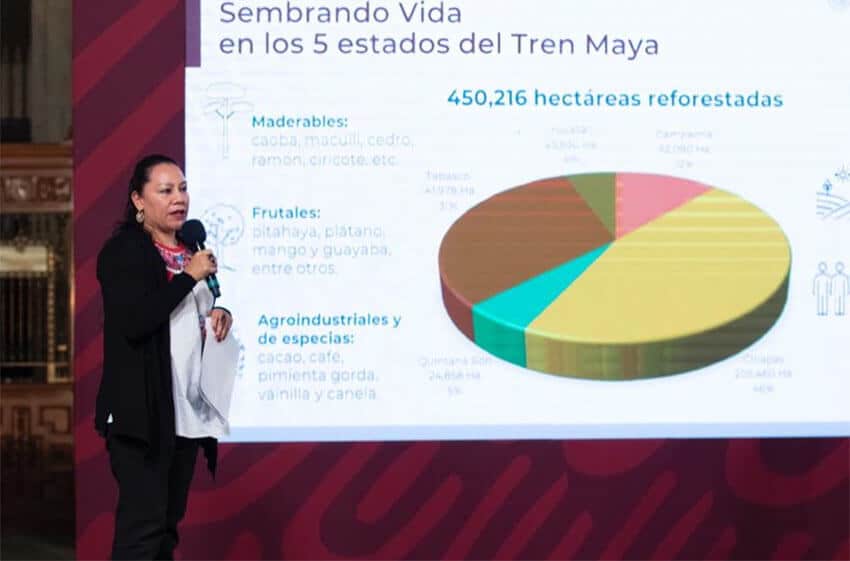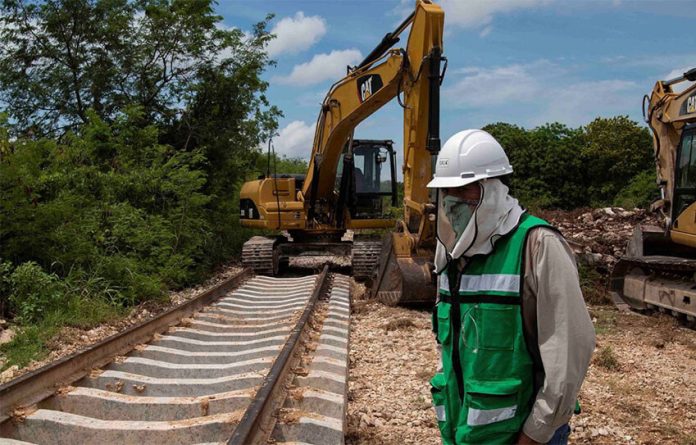Environment Minister María Luisa Albores acknowledged Monday that definitive environmental approval hasn’t been granted for four sections of the Maya Train railroad project.
She said that sections 4, 5, 6 and 7 only have provisional approval but their construction has been able to proceed thanks to a decree issued by President López Obrador in November.
The decree instructs government agencies to grant provisional authorizations and permits to projects deemed to be of public interest and national security in a maximum period of five working days so as to ensure their timely execution.
Speaking at López Obrador’s regular news conference, Albores said that sections 1, 2 and 3 of the 1,500-kilometer railroad have definitive environmental approval. They are the Palenque-Escárcega, Escárcega-Calkiní and Calkiní-Izamal sections.
The environment minister then admitted that the other four sections only have provisional approval. They are the Izamal-Cancún, Cancún-Tulum, Tulum-Chetumal and Chetumal-Escárcega sections.

“What was done is that on November 22, 2021, there was a decree to issue provisional permits,” Albores said. “It doesn’t mean that … technical studies [and] environmental impact statements aren’t being done,” she said.
However, it is unclear when those studies – which are needed for full environmental approval to be granted – will be completed.
Albores – the country’s foremost environmental official – defended companies’ capacity to work on the US $10 billion project while the environmental studies are being carried out. She said that the National Tourism Promotion Fund, which is managing the ambitious project, has experts in the field who monitor work on the railroad to ensure that the environment isn’t adversely affected.
“We’re talking about more than 100 specialists who are in the territory [where the railroad is being built]. … They’re brigades that do everything related to looking after the environment,” she said.
Albores acknowledged that there has been significant opposition to the southern part of section 5, which will run between Playa del Carmen and Tulum, but claimed that work has continued, apparently before a judge suspended work due to environmental concerns and the lack of permits.
The protesters – which López Obrador has dubbed “pseudo-environmentalists” – have made a lot of noise, but it doesn’t mean work has stopped, she said.
Opponents of the Playa del Carmen-Tulum stretch have denounced the clearing of forested land without environmental permits having been granted and warned of irreversible damage to flora, fauna and subterranean rivers in Quintana Roo.
Albores said Monday that “only 300,000 trees” will be cut down to make way for the highly-controversial section before she asserted that over 143 million trees will be planted along the railroad route thanks to the government’s reforestation and employment program, called Sembrando Vida (Sowing Life).
While the environment minister argued that work on the Maya Train sections without definitive environmental approval was legal, given AMLO’s infrastructure decree, a National Autonomous University academic took a different view earlier this year.
Ana Esther Ceceña, an academic with the university’s Economic Research Institute, told the news website Animal Político in late March that environmental impact statements have to be completed before work on the different Maya Train sections can begin.
“That is by law, and they can’t be provisional permits,” she said. “… They haven’t done land or environment studies or even economic feasibility studies. They haven’t done them in advance, they are doing them on the fly,” Ceceña said.
López Obrador, who has consistently denied that the railroad project will damage the environment and has touted the economic benefits it will bring, claimed on March 31 that all environmental permits had already been issued for the Maya Train project – one of his signature infrastructure projects – but Animal Político ran a fact check on the assertion and declared it to be false.
With reports from Milenio and Animal Político
